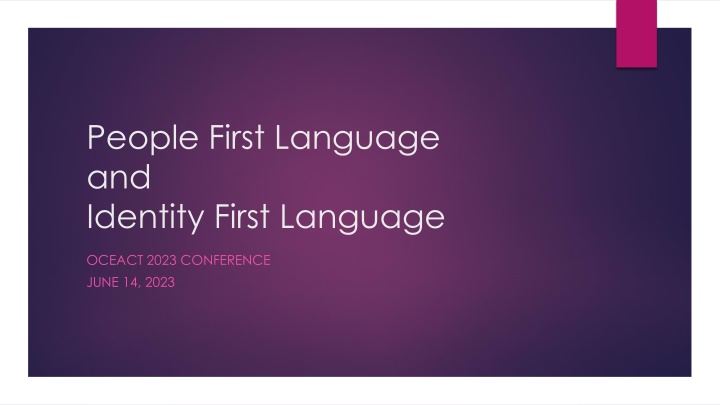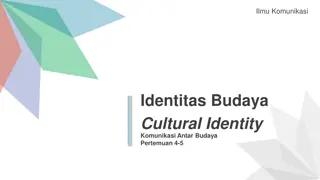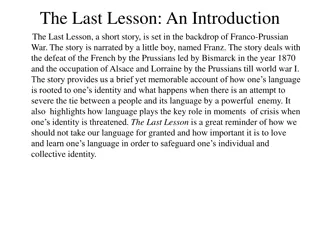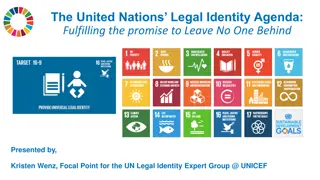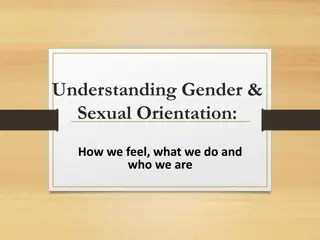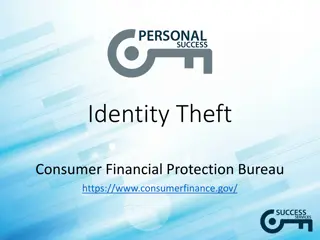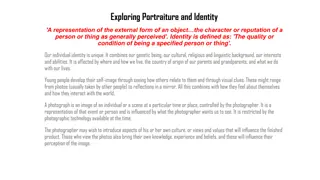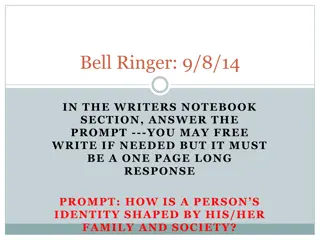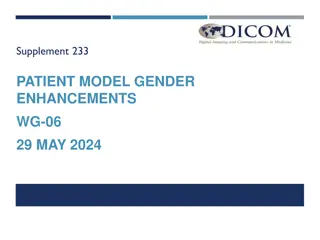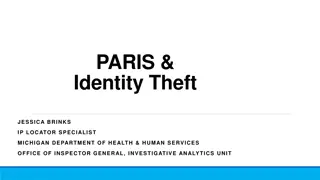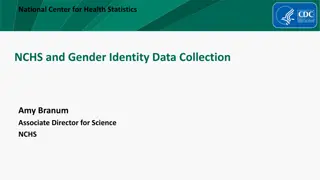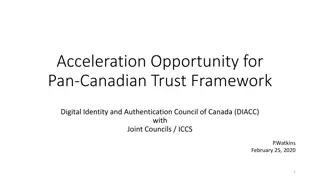People First Language and Identity First Language.
Explore the impact of language on values, beliefs, and cultural norms within ACT teams. Discover how language shapes community ideals and impacts participant outcomes. Delve into the power of language in reflecting and shaping team culture.
Download Presentation

Please find below an Image/Link to download the presentation.
The content on the website is provided AS IS for your information and personal use only. It may not be sold, licensed, or shared on other websites without obtaining consent from the author.If you encounter any issues during the download, it is possible that the publisher has removed the file from their server.
You are allowed to download the files provided on this website for personal or commercial use, subject to the condition that they are used lawfully. All files are the property of their respective owners.
The content on the website is provided AS IS for your information and personal use only. It may not be sold, licensed, or shared on other websites without obtaining consent from the author.
E N D
Presentation Transcript
People First Language and Identity First Language OCEACT 2023 CONFERENCE JUNE 14, 2023
About the Presenters Christina Lindsey Graduated from University of Oregon in 2003 B.A. in Psychology QMHA, Certified Peer Support Specialist OCEACT Statewide Trainer I have been working with ACT teams since 2012
About the Presenters Robert Mountainspring-Wood Graduated from University of Oregon in 2020 B.A. in Crime, Law, and Society Graduate student: Bushnell University (CMHC) (2023) Intern therapist: Bushnell Clinic Previously worked with men charged with domestic/child abuse in psychoeducational recovery program Diagnosed with Autism Spectrum Dx. in 2003
It seems like we talk about language a lot We talk about language when we are: Discussing Recovery focused care. Talking about individual substance use treatment. Language and how we use it also is a major focus of peer delivered services. Language is also an element of the Hearing Distressing Voices simulation. In fact, language comes up a lot throughout the CommonGround Academy, including Personal Medicine Coaching.
So why are we always talking about language? The language you speak reflects what your values and beliefs are. Anthropological linguist Daniel Everett has said that language can be considered a cultural tool. Language relates a community s values and ideals. Language is then shaped and molded by the members of the community over time.
While Mr. Everett is talking about spoken language and culture, the same idea can be applied to the work that is being done by ACT teams. For the purposes of this presentation, let s think about the culture of each individual ACT team. How does the team s values and beliefs impact participants? How are we relating our values and ideals to others as we do our work? How is our language shaped and modeled by other members of our team (community) over time?
The Power of Language Stanford linguists and psychologists found that even slight differences in language use can be corresponded with the beliefs of the speakers. Saying something like Girls are as good as boys at math can be indicative of several beliefs and/or biases. Boys have set the standard for what it means to be good at math. While girls can be good at math, they can t be better than boys. Boys are naturally good at math, girls are not. It s nice if girls do well in math but it isn t expected. Math is an area where boys are expected to excel. What happens if they don t do well in math? Are they no longer boys?
Lets use the Power of Language Being mindful of the language that we are using helps us be more Recovery focused and strengths based. Thinking about what we are saying helps to move the conversation from: What is wrong with this person? What is right with them? to Using language that is supportive and inclusive of others can help build rapport and create better connections with ACT participants, as well as reduce frustration and burn-out. Think of it as moving the mindset from I am responsible for this person to I am supporting this person in being responsible for themselves .
People First Language ALSO KNOWN AS PERSON-FIRST LANGUAGE OR PFL
What is People First Language? People First Language (PFL) removes labels that may be used to define or describe a person. PFL instead puts the person before a diagnosis, condition, and/or disability. PFL recognizes that people are multifaceted and more complicated than a simplified label. There is a shared understanding that we are all unique individuals and are more than a disability, chronic condition, or any other single characteristic. The overall intention of PFL is to avoid marginalization and dehumanization. One of the goals of PFL is to help keep the individual at the center of their care and not treat anyone as if they were a generic collection of symptoms based on a label.
An Example of PFL in Action A common example of how PFL works: Bob is a man in his 40 s who has been diagnosed with cancer. When the treatment team, Bob s family and friends, or Bob himself talks about his condition, they say, Bob has cancer. , Bob is someone with cancer. or Bob is someone being treated for cancer. No one says, Bob is cancer. or Bob is cancerous.
Everyone understands that Bob is not a disease. He is a person living with a specific condition.
The Same Idea Applies to Mental Health Conditions For individuals diagnosed with a mental health condition, the same thought process would apply. Cora is a woman in her 20 s who has been diagnosed with schizophrenia. Medical model language would state that Cora is schizophrenic . However, Cora is not schizophrenia. She is not an illness. She is not a collection of symptoms. She is a person who has been diagnosed with schizophrenia.
So instead of saying, Cora is schizophrenic. We can say: Cora has schizophrenia. Cora is a person who experiences schizophrenia. Cora is a person with schizophrenia. Cora has been diagnosed with schizophrenia. Which of these possible phrases is used will depend on a few factors. Cora s preference in how she talks about or refers to her mental health. This will always be the most important factor. The speaker s preference. Everyone has a speaking style that feels the most natural for them.
As with Bob, the emphasis should be that Cora is a person who is living with a particular condition. Cora is NOT her diagnosis or her mental health condition. As a person diagnosed with a mental health condition, Cora may feel that living with schizophrenia impacts the way she experiences and interacts with the world around her. Cora may choose to embrace Identity First Language and state, "I am schizophrenic . Cora is the only one who can make this decision. We will be talking more about IFL shortly.
When Do We Use PFL? PFL was developed specifically for use with persons who experience disabilities. This includes both mental and physical disabilities. The intention of PFL is to keep the person, and not the disability, at the center of their care. The focus is not on the disability but how the person lives with and experiences the disability.
Examples of People First Language People First Language Medical Model They are a person with a substance use disorder They are an alcoholic. He is a person with schizophrenia. He is schizophrenic. She has been diagnosed with Borderline Personality Disorder. She s Borderline. Rachel uses a wheelchair. Rachel is wheelchair bound. Wade has a disability. Wade is disabled. Jessica is experiencing a different reality than I am. Jessica is symptomatic and delusional.
Other Times When PFL is Appropriate PFL can also be applied to other groups who would otherwise be defined or categorized by a condition or a trait. People who have a substance use condition. Carl has a lived experience of substance use. Katelyn is a person with a substance use disorder. Individuals with chronic health conditions. Reginald has hypertension. Jessica developed a seizure disorder after she experienced a TBI. Groups or individuals who have experienced homelessness or other socio- economic disparities. He has experienced homelessness. They are currently unhoused.
Some Conditions Are More Stigmatized Than Others It can be argued that the more stigma a diagnosis or condition carries with it, the more important it is to use PFL.* People who have been diagnosed with a personality disorder, specifically Borderline Personality Disorder. Folks who are currently unhoused or who have a lived experience of homelessness. Individuals who use substances or have a history of substance use. Those who have a chronic condition (usually medical) that may be seen as being a result of a moral or personal failing. Conditions associated with fatness or obesity such as type 2 diabetes or hypertension. Sexually Transmitted Infections (STIs). Chronic Obstructive Pulmonary Disorder (COPD) or other conditions associated with smoking cigarettes. Conditions associated with substance use. *This is the professional opinion of this presenter.
Being Mindful of Descriptive Words When Talking About Others There is an observed trend (particularly on social media) of stating that someone is suffering from a particular condition or disability. As an example: Cora suffers from schizophrenia. or Cora is suffering from schizophrenia. It is reported by users of these phrases that these are attempts to humanize the person or their condition. In reality, this is passing negative judgement on a way of experiencing the world that is considered by the speaker as abnormal or atypical . As mental health care providers (or anyone really) we should never assume that someone is negatively affected by something that they live with every day.
Lets Go Back to Bob In the example, it was stated that Bob has cancer. It would be presumptuous of me to say that Bob is suffering from cancer. Unless Bob has told me, I do not know that Bob is physically or mentally suffering or that he considers himself as someone who is suffering. Perhaps Bob is taking his cancer diagnosis in stride with the support of family, friends, and a supportive medical team. His overall prognosis may be good. While there is some reported anxiety and fear from Bob, he has reported that he is addressing those concerns with his family and therapist. The likelihood is that Bob will come out on the other side of his treatments in good health and spirits. Only Bob can make the call that he is suffering from anything.
But What If . . . ? But what if Bob s prognosis was not good? His cancer is terminal. He is not being well supported by family or friends. His medical team can offer little hope or not much beyond pain management. He has a lot of fear and anxiety as well as severe depression due to his diagnosis. Even in this case, I do not get to assume that Bob is suffering. Only Bob can make that decision and choose whether or not to communicate that information. As a Recovery-focused practitioner, I still would avoid saying that Bob is suffering . Unless Bob told me that he was suffering and in distress. And I was using that information to advocate on his behalf.
The Same Idea Applies to Those With Mental Health Conditions or Disabilities It would be harmful to Cora to say, or assume, that she is suffering from schizophrenia. We don t know that Cora is suffering from anything. She lives with schizophrenia each and every day of her life. This is not to say that she is experiencing symptoms 24/7. Some days may be more difficult than others. She may experience more symptoms. She also sometimes just has a bad day like anyone else. Cora has lots of support from her family, friends, treatment team, and other supports. Cora has told you that she refuses to let being diagnosed with schizophrenia define her.
When Someone May Be Having Difficulty Sometimes ACT participants might be struggling or having difficulty. They could be experiencing increased stress or a traumatic event. They may be experiencing an increase in symptoms for a variety of reasons. Even when the treatment team needs to step in to support an ACT participant, we should not make judgements on how they feel or their experiences. Stating that someone is suffering, miserable, unable to recover, etc. is making a negative assumptions about another s mental health condition. This feeds back into the culture and beliefs of the team, reinforcing the idea that ACT participants with that particular diagnosis or lived experience are suffering, miserable, or unable to recover. Instead, we want to hold hope for all ACT participants and support them throughout their Recovery.
PFL is Being Used on a National Scale The Office of Disability Rights recognizes People First Language as the preferred language when referring to persons with disabilities. This includes folks experiencing mental health concerns or disabilities. The People First Respectful Language Modernization Act of 2006, . . . requires the use of respectful language when referring to people with disabilities in all new and revised District [of Columbia] laws, regulations, rules, and publications and all internet publications. People First Language is quickly becoming the preferred language used in Recovery-focused mental health organizations.
People First Language Has Limits There are times that PFL is not appropriate for use. People First Language is NOT appropriate when referring to someone s race, age, gender, sexuality, or other personally important or identifying traits. Never use PFL to refer to a personally important or identifying trait. Some examples of personally important or identifying traits include: Race Ethnicity Age Gender Sexuality These are very personally important, core identifying traits for many individuals. Using PFL when discussing or referring to a personally important or identifying trait is wrong and dehumanizing.
People First Language Has Limits There are communities that do not prefer or may outright reject, PFL. This includes the Deaf, Blind, and Autism communities. The fat activism and size acceptance communities. There are others as well. There is no one size fits all approach to language. If you are not sure, ask the person about their preferences.
Identity-First Language ROBERT MOUNTAINSPRING- WOOD, BA
Remember, its all about respect. When in doubt, default to personal preference. If you re not sure what someone s personal preference is, ask.
What is Identity First Language? Identity First Language (IFL) is a way of identifying with a part of you that is critical in who you are and through what sort of lens you view the world and how you interact with it as well as, potentially, how the world interacts with you. Creates a sense of culture within a community of shared experience Removes otherness and normalizes the experiences and perspectives Increases a sense of autonomy and self-determination. (Botha, Hanlon, & Williams. 2021.)
Examples of IFL IDENTITY FIRST Autistic person PERSON FIRST Person with autism/ASD, person on the spectrum Adopted person Person who was adopted Diabetic person Person who has diabetes Schizophrenic person Person with schizophrenia Sick person Person who is ill/sick Unhomed/unhoused/homeless person Person experiencing homelessness Addict/addicted person/alcoholic Person living with addiction/alcoholism Athlete/gamer Person who plays sports/video games Counselor/social worker Person who is employed in the counseling/social work profession Person who catches wild Pok mon and forces them to fight other Pok mon in organized fighting rings Person who is highly enthusiastic about Star Trek Pok mon trainer Trekkie/Trekker Samurai Person who is of noble birth and a member of the officer caste of pre-Meiji era Japan
Who uses Identity First Language? WHOEVER WANTS TO. Autistic community: 49% (Bury, 2020), 81.4% (2020, OAR) Blind community Deaf community Fat acceptance community
Why Identity First Language? IFL is a way of owning an aspect about oneself IFL is a way of discerning something that is an inherent part of someone s identity versus being something about them Consider a handbag, watch, or a wallet. They can be removed, put away, even separated from entirely.
A point of note Think back to the table from before. Some of the PFL examples were awkward and clunky, but so were IFL examples. For example: Sally is a person with calmness (is a calm person) Kimiko is a person with athleticism (is an athletic person) Hayden is a person with intelligence (is an intelligent person) Jeremy is a truck driver (is a person who drives a truck for a living) Amethyst is a person who was in the military/is a veteran (often used interchangeably) Sometimes we do things because it s the right way. Sometimes we do things because it looks/sounds/feels better. Ultimately, we want to make sure that we are using the preferred terminology of those we are speaking to/about.
No community is a monolith There are ~8,000,000,000 people alive on the planet right now. Each person has their own experiences and intersecting perspectives. Cultural context matters, and people are different. Both are true. Though IFL is generally preferred by self-advocates in the autistic, deaf, and blind communities, if someone prefers PFL, THEN USE THAT WITH THEM (Marschall, 2023).
No community is a monolith, however when we are talking, writing, and researching about the larger community, we must take into account community voices when deciding which language to use (Marschall, 2023).
Robs personal perspective I am a human. I am a counselor. I am autistic. I m LFC til I die (Go Reds). I am a husband. I grew up in an abusive household*. I am a father. I am a millennial. I am originally from the American South*. I was adopted*. I am an Oregonian. I am a Tolkiendil. I am Jewish. I play D&D*. I am a veteran. I am an emergent Trekkie. I am a student. I like to play soccer*.
Christinas personal perspective I identify as a woman. I am a Peer Specialist. I am a person with a lived experience of mental conditions. I am a person who enjoys crafting. I am also a crafty person. I am a wife. I am an avid reader. I am someone who was born in the Southwest. I am a person who enjoys playing games. I am an Oregonian. I am someone who enjoys building with Legos. I am a student. I am a fat person/person of size. I am diabetic. I am a cat mom. I consider myself a nerd.
Identity First Language as a dialectic We have numerous identities Dialectics can involve more than two (seemingly) conflicting things Wearing many hats A dialectical framework gives us a chance to honor these many hats All are valid and significant IFL HOLDS SPACE FOR INDIVIDUAL IDENTITIES, WHILE HONORING THE INTERSECTIONALITY OF IDENTITIES
Wearing multiple hats People have multiple identities, multiple hats that they wear Some hats are harder to remove, some cannot be removed at all Being autistic, blind, and/or deaf are daily fixtures of our lives Proponents of IFL use language that represents this
What Does the Autistic Community Say? Autism is not something I have, it s an integral part of who I am. When a publication uses the word autistic, I feel seen and accepted. My autism is not an accessory that I can set aside. It is not something external that has latched onto me. It is not an illness or disease I have caught. It is a fundamental, inseparable part of me and who I am. I use them interchangeably sometimes and don t personally take offense to either. However, with autism, I try to use identity-first because that s what the neurodivergent community seems to prefer.
What Does the Autistic Periphery Community Say? I take my lead from the community I claim to support the Autistic community. With so many of my Autistic friends, loved ones, and mentors indicating that they view Autism as a core part of who they are and that identity-first language is their preference, I want to honor their feelings. It helps increase acceptance. Autism is part of the person and adds to their strengths and weaknesses. By disassociating (e.g., person with autism) it implicitly attaches some stigma. Autism is not an accessory that can be set down it comprises the very nature of autistic people. Source: Organization for Autism Research
Other Communities Schizophrenia community Diabetes community Disability community Fat activism community
A case for Person First Language from an Identity First perspective There are those within the autistic community that use PFL. Practical reminder that it s all about preference
Identity First vs. Person First Language: whos right? There is no inherently right or wrong answer. What is the preference of the subject person or group? What is the intent of the speaker? What is the history? LISTEN FOR CLUES. FOLLOW THE CUES.
A Final Thought If you are unsure as to whether you should use people-first or identity-first language in order to be respectful, the best thing to do is to ask people themselves.
Respectful Language HOW PFL AND IFL ARE PART OF A LARGER GOAL
The Goal Our overall goal is to use language that: Is respectful of those around us. Honors the experiences of others. Is not othering. Othering language is language that intentionally or unintentionally excludes people based on a trait, characteristic, or belief. We want to use language that is mindful that we do not always know who is in the room . We may not always know if someone is part of a marginalized group. There are many reasons why someone may choose to not disclose element(s) of their identity. We might not be aware of someone s history or if they have experienced trauma. By making assumptions, we can cause unintentional harm to someone else.
Using Respectful Language is a Long-Term Process Continuously thinking about the words we use and adjusting our language can be hard. Language is constantly changing as different voices and lived experiences come to light. This means that we re pretty consistently retraining our brains on using the appropriate or best words in a given situation. We might mess up sometimes and that is okay! When we are engaged in our honest and best attempts at using current, thoughtful, and respectful language, we are showing others that we care about them.
